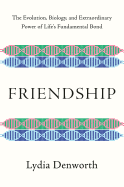
Human beings can lead healthy, happy lives while remaining single and child-free. However, scientists have discovered that friendship is "a biological need for connection that must be met to achieve basic health and well-being."
Science journalist Lydia Denworth traces scientific research that has studied insects, monkeys and human infants and concluded that social connection and altruism are keys to survival among all three species. Further research with infants shows that connection begins in the womb, when babies learn to recognize their mothers' voices. This connection strengthens after a child is born; by looking at faces that become familiar, listening to human speech and experiencing soft and gentle touches, the "social brain" begins to develop.
Friendship follows the need for human connection, from the parallel play of young children to the tribal relationships of older children and adolescents, showing that isolation in childhood can eventually lead to "elevated blood pressure, increased aggressiveness, and increased stress activity." From birth to old age, loneliness affects the brain and contributes to poor health. Isolation, scientists found, is "a potential killer" that can damage the cardiovascular system in young people, resulting in high blood pressure when they grew old.
Exploring the effect that conversation has upon the brain, the role played by "digital friendship" and the deepening need for companionship as one grows old, Denworth shows that perhaps the most powerful way to maintain good health and achieve longevity is to establish strong friendships and keep them alive. --Janet Brown, author and former bookseller

